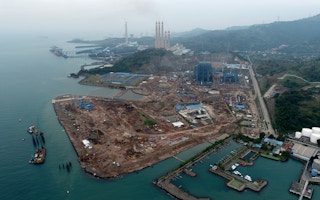Locals and advocacy groups in Indonesia have filed a complaint with the International Finance Corporation (IFC), the World Bank’s private lending arm, over “back-door” support for new coal-fired power plants under development.
To continue reading, subscribe to Eco‑Business.
There's something for everyone. We offer a range of subscription plans.
- Access our stories and receive our Insights Weekly newsletter with the free EB Member plan.
- Unlock unlimited access to our content and archive with EB Circle.
- Publish your content with EB Premium.
The complainants say that a US$15.36 million equity investment in Hana Bank Indonesia supports the construction of two new coal plants, Java 9 and Java 10, which are expected to cause thousands of premature deaths and emit over 250 million tonnes of carbon dioxide.
The latest development adds to a feud local groups have had with the two new coal units since as early as 2020. Indonesia relies on coal for 60 per cent of its electricity needs, and have been struggling to replace the pollutive fuel with cleaner energy sources.
The investment into the subsidiary of South Korea’s Hana Bank was made in 2019, to support the bank’s growth strategy and finance its digital infrastructure ventures, according to an IFC filing. IFC also owns 10 per cent of Hana Bank Indonesia’s shares.
Java 9 and Java 10 would add 2 gigawatts (GW) in capacity to an existing 4GW Suralaya coal power complex in Banten province, just west of capital Jakarta. About 80 per cent of the new construction work has been completed and the plants could be completed in 2025, according to advocacy group Banktrack.
The complaint, filed with non-governmental groups PENA Masyarakat and Trend Asia from Indonesia, as well as US-based Inclusive Development International and Netherlands-based Recourse, was sent to the IFC’s Compliance Advisor Ombudsman.
The grievance letter asks for works on Java 9 and Java 10 to be stopped immediately, and if not possible, for the facilities to be “upgraded and modified” to reduce the social and environmental harms. The letter also demands “fair and full redress for harms already suffered”.
The Suralaya complex has already caused respiratory problems, and affected tourism, farming and fishing in the area, the groups said. Families have been forcibly evicted without adequate compensation for the expansion project, they added.
“The Java 9 and 10 expansion is totally unwarranted – electricity needs in the area are already being met and the Java-Bali grid is already oversupplied,” said Novita Indri, energy campaigner at Trend Asia.
“That’s the opposite of what’s needed to achieve the net-zero emissions target and undermines the Paris Agreement,” Novita said.
Complainants said the IFC “failed to identify” Hana Bank Indonesia’s new investments in Java 9 and 10, and did not appropriately assess the “mega coal project” against its social and environmental policies.
The IFC launched a “Green Equity Approach” in 2019 to get intermediary clients to increase climate-related lending and reduce coal exposure as much as possible by 2030. IFC further stated it would stop clients funding new coal projects earlier this year.
But the community groups say intermediaries can still invest in captive coal power and underwrite bonds for coal developers. It is unclear how IFC is enforcing its approach on existing equity clients, they added.
“Support for Java 9 and 10 is completely at odds with the World Bank’s mission—the plants will exacerbate, not reduce, the impacts of both poverty and climate change,” said Kate Geary, co-director of Recourse.
According to BankTrack, the Java 9 and 10 expansion has already garnered some US$ 3.9 billion in funding, from lenders including Singapore’s DBS, Malaysia’s Maybank and Indonesia’s Bank Negara Indonesia.
Indonesia officials said in 2021 that it would stop approving new coal-fired power plants, though many projects in the pipeline could still go ahead. Last year, it said new coal power plants tied to strategic national projects and committed to emissions reductions targets can go ahead.
The country still wants to end coal power entirely by 2050.
It has a US$20 billion deal with wealthy countries and financiers to retire coal plants early and swap them out with clean energy, though a detailed investment plan that was supposed to go public last month was pushed back by Indonesia till end of the year.
The fourth most populous country wants to reach net-zero emissions by 2060. A senior minister recently said 2055 was possible with more financing and international cooperation.
In response to queries, an IFC spokesperson said the lender did not directly support the construction of the Suralaya coal power complex, has not taken part in its development, and does not have the ability to halt work on the project.
IFC “welcomes a productive dialogue” with the ombudsman and other stakeholders regarding the complaint lodged by the advocacy groups, the spokesperson added.
Note [15 September 2023]: This article has been edited to include IFC’s response to media queries.

















